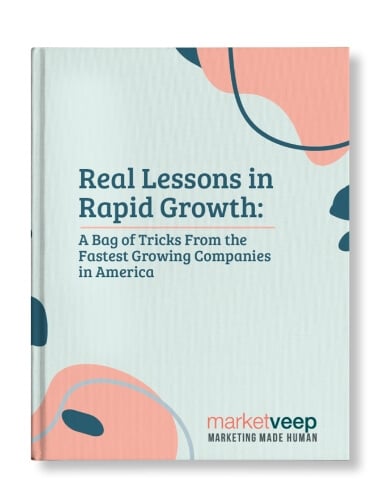What Does a Content Marketing Agency Do?

 When you purchase through links on our site, we may earn an affiliate commission.
When you purchase through links on our site, we may earn an affiliate commission.
By Jennelle McGrath
Content marketing is a digital marketing strategy that involves the creation and distribution of videos, graphics, and written materials.
Acontent marketing agency produces and shares these materials on behalf of other businesses, helping them generate leads and close sales.
Table of Contents:
- What Is Content Marketing?
- What Are the Benefits of Content Marketing?
- Why Partner with a Content Marketing Agency?
You’ve probably heard of content marketing. Maybe you’ve even heard that it’s the way of the future.
If you've read any marketing content, it probably looked clean and was easy to understand. Maybe you even found it compelling!
Getting to that point requires more than writing a few blog posts and putting pictures on social media, however. Some parts of content marketing are quite technical. But every business can use content marketing to get more customers.
Content marketing is a form of inbound marketing, which focuses on attracting customers through means that aren’t interruptive. Instead of bombarding your audience with ads in their living room, you allow them to come to you on their own time. This usually happens when they’re doing research online.
Content marketing agencies arose to fill a specific need. Businesses wanted to engage in content marketing but needed help with direction and implementation. Creating content can take time and acquiring all the necessary software to track a content strategy can get expensive. By working with a content marketing agency, businesses can outsource the effort and reduce costs.
To understand what a content marketing agency does, you must first understand content marketing – not just how it works, but why it works.



What is Content Marketing?
Like most forms of inbound marketing, Content marketing is a digital strategy. It revolves around the creation and circulation of content. “Content” can be defined as written materials, graphics, videos, and any other type of readable or consumable asset. The goals of content marketing are to drive traffic to your business website, build trust, convert audiences, earn new customers, and delight existing customers.
Contemporary content marketing originated with the birth of the internet, but businesses have been using content for decades. Charts, graphs, and product guides have always been useful, especially for sales purposes. Some would even argue that content marketing began thousands of years ago with cave paintings, but that’s probably stretching it.
By design, most content is helpful, not a sales pitch. You want to avoid language about your own business and why people should buy, especially if you’re writing top-of-funnel content like a blog post or a how-to guide.
There are many different approaches to content marketing and many different types of content. The same content strategy won’t work for every business. Nonetheless, at least one form of content marketing is always relevant, even if you’re just creating sales decks.
For example, B2C businesses may be better served by focusing on platforms such as Facebook. B2B businesses that sell high-ticket, long-term services may want to focus more on long-form content and then share that content through platforms such as LinkedIn.
Blogging
Blogging is a tried and true content marketing strategy that’s been around for decades. As it stands, it’s looking to be an important strategy for years to come. According to HubSpot, 53% of marketers say blog content creation was their top inbound marketing priority in 2017.
Many businesses use their blogs to distribute news or press releases about their company. Some also use it to provide company insight into the latest news in their industry. Both of these strategies are worthwhile. They position your company as a thought leader and can help you build trust with readers.
However, there are other objectives to shoot for with your blogging strategy.
SEO
Blogging plays an important role in SEO, or search engine optimization. Each blog post has a chance to rank in search results for relevant search queries and keywords. Select your keywords based on the terms your customers search for and the terms you think you can and should rank for. The goal of this strategy is to rank high in search results for important terms and drive more traffic to your website.
For example, this post has been optimized for the following keywords: “Content marketing,” “content marketing agency,” “benefits of content marketing,” “content marketing strategy,” and “what is content marketing.” If you arrived here by doing a search online, you may have searched for one of these keywords or something similar.
When blogging, you aren’t just writing for Google, you’re writing for a reader – a human being. Choose topics that are of interest to your customers. What questions have they asked your company? What makes them choose to do business with you? Develop personas based on your customers and write each blog post with one in mind.
It’s important to blog regularly so your blog stays relevant in search results. You also want to address changes in your industry. Develop a blogging schedule and stick to it, even if you’re only putting up a couple of posts per month. If you partner with a content marketing agency, set a monthly blogging schedule for them and review each post before it goes live.
Content Offers
Content offers convert your website visitors into leads. This type of content is gated, which means your audience can only access it by filling out a form on a landing page. Once the form is filled out, you receive their contact information and they receive a helpful piece of content.
There are hundreds of types of content offers you can create. Checklists, how-to guides, eBooks, whitepapers, and industry reports are some of the most popular. However, your content offers don’t have to be lengthy written pieces. Your customers may also find images, videos, Infographics, and charted statistics valuable. Whatever you chose, pick the type that will resonate most with your audience.
By optimizing landing pages, you can drive traffic to your content offers. But their purpose isn’t to drive traffic, necessarily. Instead, content offers fill up your contact database. the best ways to get eye son your landing pages are to share them on social media and place CTAs on blog and web pages. Once you’ve acquired a contact, you can send them marketing emails and track their activity on your website.
Share your landing pages on social media or post digital ads for your offers to bring in more leads. Place calls-to-action on your website and on your blog posts to get readers interested. A call to action is a button that brings a visitor to a landing page. Here’s an example of a call-to-action (CTA):
Creating content offers takes time. It involves good writing, design work, and someone who can work their way around a content management system. If you partner with a content marketing agency, establish a schedule for creating content offers. They’ll have the tools and skills you need to post them to your site and distribute them.
EVEN A LITTLE BIT OF CONTENT CAN MAKE A DIFFERENCE.

Social Media Posts
Social media marketing is a strategy in and of itself, but it’s also a branch of content marketing. In fact, social media and content marketing are best used in tandem. Each social post is a piece of content designed to compel an audience to act.
 Whether you want them to discover your business, read your post, click on it, or share it, the message you post is vitally important. It helps to have a good copywriter on hand to compose these messages.
Whether you want them to discover your business, read your post, click on it, or share it, the message you post is vitally important. It helps to have a good copywriter on hand to compose these messages.
When posting over time, include a mix of your own content and the content of others. If you’re part of a business partnership, you can exchange content to drive traffic to each other’s websites. Otherwise, you can share content from industry-related sources like online publications and industry blogs. These won’t drive traffic to our website directly, but they can earn you followers and garner interest in your brand.
Don’t be afraid to share often, even once or twice a day, especially if you have no social media following to start with. Sharing is easier when you have social media automation tools. These types of tools also allow you to collect data so you can determine which types of posts get the most views, clicks, and shares.
Other forms of social media marketing may be of interest to you, such influencer marketing, active interaction, and social media advertising. If you partner with a content marketing agency, consult with them to determine your best options. Your agency can also help you do the menial tasks associated with this strategy.
At the very least, consider sharing your content on social media. This type of publishing is an important part of any content marketing strategy.
Videos
More and more marketers are eyeballing video, and for good reason. Video content is expected to claim more than 80% of worldwide internet traffic by 2019. In the U.S. it will be over 85%. Videos are highly shareable pieces of content and are easier to consume than long written pieces, like the one you’re reading right now. They also provide the viewer with a more personal glimpse into your business.
How you do video will depend on your business and your target customers. There are many different types of videos to choose from:
- Educational videos
- How-to videos
- Brand value videos
- Experience/event videos
- Video emails
- Product demonstrations
- Company culture videos
- Testimonials
- Video ads
- FAQ videos
- Thank-you videos
As with any other type of marketing content, the types of videos you choose will depend on what part of the funnel you’re targeting. Educational videos are better for the top of the funnel, while FAQ and product demonstration videos are better for the bottom.
The one drawback to making videos is that they need to be well done to be effective. Most people will be disenchanted by a poorly made video. Not everyone at your company will be comfortable on film. Like TV ads, videos with high production value can be expensive. That’s why so many businesses reach out to third-party marketers for video services. A content marketing agency may have the capacity to create videos, or they may work with another party.
Regardless, it’s worth your while to explore video. Videos get 1200% more shares on social media than text and images combined. You can start by making your own. Who knows? Maybe someone on your team has some acting panache. If you’ve done any webinars in the past, you may already have some good practice.
Original Graphics and Images
Infographics, photographs, designs, charts, graphs, and other images are highly-sharable and easy to consume. Visual content taps into a different part of the psyche than written content. 65% of people are visual learners, which means they process information more easily when it’s transmitted through images. Presentations with visual aids are also more persuasive than those without.

It’s common practice to accompany your written content with images. Articles with images get more views and produce higher rates of retention. If you’ve read any business blogs, you’ve probably noticed that most of them have an image at the top, at least. You can take it a step further, though.
If you have a graphic designer on your staff, or if you work with a content marketing agency that has a designer, take advantage of their talents. Design graphics for your website and to share on social media. Create a brand identity through images. You’ll be more easily recognized.
Original images are always preferable to stock photography. If you have the time and means to produce your own images, do so. Have your designer edit those images and customize them for your brand.
Here are a few types of visual content you can use:
- Original photographs
- Designed graphics
- Image quotes
- Cartoons
- Infographics
- Presentations and SlideShares
- Screenshots
- GIFs
Third-Party Graphics and Images
When using third-party images, be aware of copyright laws. Any creative work that is published, online or otherwise, is automatically given a copyright designation. The creator does not need to file paperwork to copyright their image. It belongs to them unless otherwise specified.
However, there are plenty of image sources that feature Creative Commons images. There are a few different types of Creative Commons designations. Some of them allow you to use images legally without accrediting the author. Others require accreditation or may have limits on commercial usage.
Thankfully, there are a lot of websites that feature free images that you can use without accreditation (although giving the authors credit is a nice thing to do). A quick web search for “creative commons images” will reveal many of them. You can also use any images that are considered “public domain” without payment or accreditation. Many public domain images are old or historic, however.
What Are the Benefits of Content Marketing?
Most of today’s businesses have a website and are present on social media, but these channels need content for them to be effective.
You can build out web pages that provide details on all your products and services, but if you don’t have an active blog, you may be missing potential web traffic. You can create pages on every social media platform, but if you aren’t posting original content, you’ll have a hard time generating leads.
If you’re still skeptical of content marketing, you aren’t alone. It’s an inexpensive but time-consuming strategy, and you may need to keep at it for a while before you start seeing palatable results. But the benefits of content marketing are many, and the work you do now will pay off long into the future. Old content can be reused to capture new leads. Content offers live permanently on your website.
With the right digital marketing software, you can track the effectiveness of this strategy over time. You’ll have a clear view of which content is performing and which isn’t. You can use this information to steer your content marketing strategy moving forward.
Businesses usually partner with a content marketing agency because they need help with the day-to-day tasks associated with creating and disseminating content: writing blog posts, creating content offers, curating articles, posting to social media, etc. As long as you have a strategy in place and you stick to it, you’re likely to see results.
Expand Your Website’s Reach
Building out content on your website is a great way to drive organic traffic. “Organic” traffic describes the web traffic you generate by showing up in internet search results. It stands in contrast to direct traffic (when someone types your website’s URL), traffic from your social media accounts, traffic received through your paid advertising, traffic received through email sends, etc.
Organic traffic delivers leads on a relatively consistent basis at little or no cost to you. Once you’ve published content, it stays live. Search engines will be able to keep finding it month after month if you follow basic SEO practices. Blogging is the most popular way to expand a website’s reach, though you can also create additional web pages and acquire backlinks on other websites.
Improve Brand Awareness
No one will know what your brand stands for if they can’t find information about it. Posting digital content improves brand awareness in two ways. First, it educates your readers about your business. Second, it reaches wider audiences than your website would on its own. This is only thanks to the internet and the prevalence of both search engines and social media.
It’s tempting to only write content pertaining to your products and services. While you should certainly do this, don’t hesitate to write some content that speaks to a broader audience. Write about topics that show what your brand stands for. For example, we’ve written articles about company culture and team building.
Build Loyalty, Trust, and Authority
You can only tell so much about a company by browsing the few web pages they’ve posted on their website. Give your visitors a chance to go deeper. According to Forrester, 74% of B2B buyers conduct more than half of their research online. If you maintain an active blog and have long-form content available for download, you’ll create more opportunities to engage with your buyers.
B2B buying cycles are generally pretty long. New research suggests that they may even be getting longer. Your high-quality content won’t just make it easier for your customers to find you. It will give them a resource they can keep coming back to while they make a purchasing decision.
Convert More Leads for Less Money
Content, especially written content, is a relatively inexpensive way to generate leads. It costs far less than digital advertising and traditional outbound marketing practices. Ad campaigns eventually end, but your content stays live unless you decide to take it down.
Businesses that engage in content marketing have conversion rates that are six times higher than those that don’t. If it’s still relevant, your content keeps working for you. If you need to generate leads fast but you don’t want to spend money on ads, pick a content offer that you wrote a year ago and share it again on social media. A single piece of your best content may even generate a clear majority of your organic leads.
Delight More Customers
Content isn’t just important for generating new prospects. You can also use it to keep in touch with your existing customers. For example, you can create a customer-oriented newsletter with your latest blog posts. If provide a service to your customers, you can create and update a web space for FAQs and service issues.
Sometimes, your current customers may be your best source of new revenue. If you offer a service that’s upgradable or expandable, you can use content to drive interest among your existing customers. Using a contact database with segmentation tools to ensure the right messages reach the right people.
Why Partner with a Content Marketing Agency?
If you don’t have a fully staffed marketing department tucked away somewhere, you may want to consider partnering with a content marketing agency. There are pros and cons to working with an agency, just as there are pros and cons to staffing your own marketing department.
But even if you already have a marketing department, a content marketing agency can help. Marketing agencies take on additional tasks that your own team doesn’t have time for. They also expand your marketing capabilities without the overhead of hiring additional employees.
An agency is outsourced, so you won’t have direct oversight of their staff. It may take some time to get setup with your content marketing agency before you start seeing results. However, this pales in comparison to how long it takes to hire and train new staff. An agency comes with all the expertise you need to launch your marketing campaigns.
Here are the pros of partnering with a content marketing agency:
-
Instant Expertise. You get instant access to all the skills you need to conduct marketing campaigns. There’s no need to go through hiring multiple marketing professionals.
-
Lower Cost. By outsourcing some or all your marketing tasks, you’ll save money on salaries and overhead. You may even save money on marketing software if your agency partners with software providers. For example, we’re a HubSpot partner, so all our clients get a discount when they sign up for the HubSpot CRM.
-
Sales Support. A content marketing agency is a team of creative people. In addition to implementing your marketing strategy, they can support your sales team by creating branded sales decks, leave-behinds, one-pagers, email scripts, and more.
-
Fresh Perspectives. Sometimes, you need new ideas to break through with your marketing. Getting an outside perspective on your strategy can reveal opportunities for improvement.
-
More Time. Because you aren’t managing your agency team directly, you’ll get the benefits of marketing without the time-crunch from oversight. All you must do is have short, regular calls with your point of contact at the content marketing agency to see how your strategy is going.
If you’re still unsure about content marketing, don’t hesitate to experiment with it. Write a couple of short blog posts and post them on your website. Share them on social media if you’d like. If you’ve got any sort of analytics on your site, check it over the course of a month to see if there are any jumps in traffic.
FAQs
What does a content marketing agency do?
Now back to the pressing question - what is a content marketing agency, and how can partnering with one help grow your business? While digital content agencies come in several different shapes and sizes, their overall goals are the same. A good agency can help you:
-
Design and plan the right content marketing strategy for your goals and business.
-
Create and distribute the content needed to bring your strategy to life.
-
Analyze and track the performance of various pieces of content and your overall campaign.
Some companies hire content marketing agencies to handle all their content marketing needs, while others utilize agencies to supplement their in-house marketing teams. Whether you want to work with an agency on a continuous or short-term basis, many agencies offer flexible plans designed to meet the needs of different clients.
How much do content marketing agencies cost?
The truth is that there’s no such thing as an average cost when it comes to working with a content agency. One business might pay around $2,000/mo while another pays their agency tens of thousands each month to handle a much larger scope of work.
Pricing can vary widely depending on anything from the size and goals of your business to the size and specialties of an agency. For example, some agencies focus on niche strategies such as SEO or social media, while others offer all-around omnichannel services.
Statistics from Forbes reveal that 36% of businesses spend anywhere between 10 - 29% of their overall budget on content marketing. But also that content marketing’s average ROI is around 177%.
At Market Veep we recognize the serious flaws in the traditional agency pricing model. That’s why we utilize a unique point pricing system designed to help maximize your budget.
How do I hire the best content marketing agency for my business?
Much as in dating, finding the “perfect match” can mean very different things to different people. The key often lies in finding a content marketing agency that best aligns with your goals, budget, and target audience.
Here are some helpful questions to ask yourself as you vet potential agencies:
-
How does content marketing support digital marketing initiatives in your business overall? Does the agency offer the type of services you need to improve your weaknesses and capitalize on your strengths?
-
Does the agency have a demonstrated track record of achieving goals similar to your own?
-
Has the agency worked with other clients of the same business size, industry, or target audience as your own?
-
What type of pricing plans and models does the agency offer?
Last but not least, find out whether the agency offers a free consultation or analysis. Such offers can be a great way to gauge whether you vibe with an agency’s vision of how to take your marketing efforts to the next level.
Get The Latest From
Market Veep
RELATED ARTICLES

Embracing Digital Marketing Strategies in Industrial Markets
After all, traditional marketing that focuses on in-person sales visits and printed marketing...

Event Marketing Examples for Every Funnel Stage
But exactly what is event marketing, and how can you incorporate it into your overall marketing...

Exploring the Latest Manufacturing Marketing Trends
Manufacturing marketing trends are no exception, as many top companies now rely on digital...

Get Growing!
Download our eBook and get advice from 8 CEOs of Inc. 5000 companies in their own words.

GREAT MARKETING PARTNER
Market Veep is a great firm that handles all of our marketing efforts. This is the second time that I have used the firm. I highly recommend Market Veep!

Cres F.

EXCEPTIONAL EXPERIENCE
Market Veep's Onboarding Experts in Inbound Marketing are an absolute game-changer! From the get-go, their approach was top-notch. Market Veep's team has undoubtedly set the bar high for excellence in inbound marketing. Five stars aren't enough to commend their outstanding service!

Matthew W.

BEST PARTNER EVER!
As a growing business, setting up our first-ever HubSpot account was a crucial step towards enhancing our marketing and customer management strategies. From the moment we contacted MarketVeep, their team demonstrated professionalism, expertise, and a genuine desire to help us succeed. Overall, our experience with MarketVeep was exceptional, and we couldn't be happier with the results. Thanks to their guidance, we are now utilizing HubSpot to its fullest potential, streamlining our marketing efforts, and nurturing leads more effectively.

Jean M.

SET UP FOR SUCCESS!
We had an exceptional experience with Market Veep! Their team is professional, super organized, and friendly, and I truly enjoyed working with them. They executed on time and made the process super easy with their organization and documentation. In addition, they provided additional guidance and answered my many questions as I was new to HubSpot, and provided documentation resources for future use. We're now set up to leverage all that HubSpot marketing has to offer, and we couldn't have done it without Market Veep's expertise.

Bailey G.

5 STARS FOR MARKET VEEP!
We had a fantastic experience with Market Veep! Their expert team seamlessly guided us through implementing HubSpot and provided comprehensive training across Sales, Service, and Marketing Hubs. Their knowledge and support significantly enhanced our workflow and overall efficiency. Highly recommend Market Veep for top-notch HubSpot solutions!

Anneke C.








